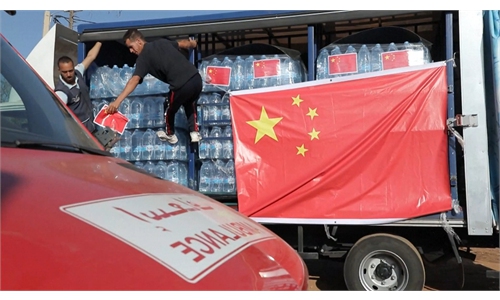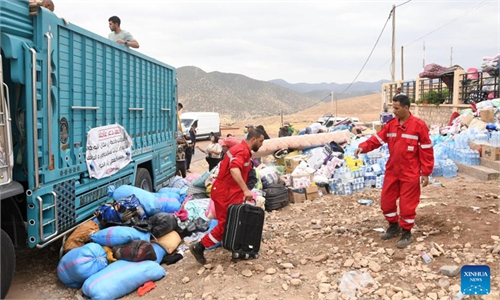IN-DEPTH / IN-DEPTH
Chinese medical team in Morocco serves patients with professionalism and love for decades
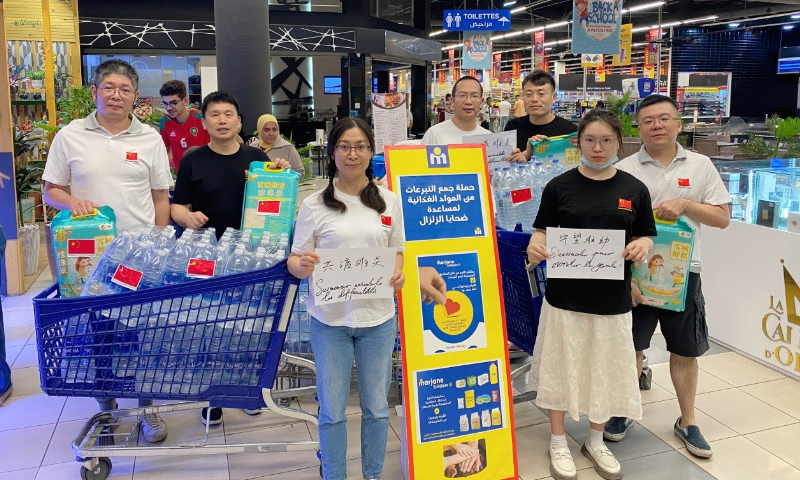
Members of the Chinese medical team in Taza, Morocco, donate drinking water and rice to those affected by the earthquake. Photo: Courtesy of Yu Yuejin
After performing an emergency C-Section on a pregnant patient and hearing a cry from the delivered baby, Chinese doctor Zhang Qian breathes a sigh of relief. Despite risks posed by performing such a delicate surgery amid earthquake aftershocks, Zhang and her colleague Liu Yan went ahead, undaunted, determined to save the life of a patient with symptoms of abruptio placentae and her unborn child, just two hours after Morocco was rocked by an earthquake.
"The only thing I was afraid of at that time was an unexpected complication with the expectant mother and her baby," Liu told the Global Times.
Zhang and Liu are members of the Chinese medical team stationed in Morocco. China has been dispatching medical teams to Morocco since 1975 as sourced from the Chinese city of Shanghai. To date, a total of 1,944 medical staffers in 195 batches have offered medical services in public hospitals across the North African country, according to the Xinhua News Agency.
The Chinese medical team in Morocco has made significant contributions to post-earthquake rescue efforts. Among its nine detachments, those stationed closer to the areas hardest hit by the earthquake, have been treating the injured, donating blood, and dispatching medical equipment to where needed, while those farther away have actively donated supplies, the Global Times learned.
The medical detachment located in Taza, some 400 kilometers away from the most-affected city of Marrakesh, quickly donated 20 kilograms of rice that they brought from China and 180 1.5-liter bottles of drinking water after the earthquake. Drinking water is one of the most essential supplies, said medical staffer Yu Yuejin, director of the detachment.
"We have been here for more than nine months, and have deep feelings for this place," Yu told the Global Times. "We are eager to offer our help."
'My responsibly'
Yu is an otolaryngologist from the Shanghai Seventh People's Hospital. In December 2022, as a member of the 195th batch of the Chinese medical team stationed in Morocco, Yu left Shanghai for Taza, a remote, dry, hot, and comparatively less developed mountainous city in northern Morocco.
In contrast to well-known Moroccan tourist cities such as Casablanca, Taza remains relatively obscure to the outside world. Yu said that it has poor medical infrastructure which is "similar to that of China in the 1980s and '90s."
"In ENT (ear-nose-throat) departments in China, now we perform thyroid surgeries with endoscopic surgical techniques and treat adenoidal hypertrophy with a nasal endoscopic system," she exampled. "But here in Taza, neck surgeries are usually done using traditional electric blades, electrocoagulation [electrotome], and surgical sutures and needles."
Therefore, to better help improve local medical conditions, China has regularly donated medical equipment to Morocco throughout the years apart from dispatching personnel here. Each year, the Chinese medical detachments in Morocco draw up a list of the medical supplies that local hospitals need most, and submit them to the Chinese health authority, according to Yu.
Yu recalled a surgical procedure she performed on a five-year-old Moroccan girl who had swallowed a coin with esophagoscopic equipment just received from China. Prior to that, similar patients with foreign bodies in their esophagi had to be transferred to a higher-level hospital 100 kilometers away for help, and the whole process would last as long as a week, causing patients a large amount of pain.
"Now with the esophagoscope, I can quickly perform a procedure after the patient has fasted for six hours," Yu told the Global Times.
Morocco's shortage of medical equipment has been largely improved thanks to the continuous donations from China. However, in earlier times, it was not unusual for the Chinese medical staffers to make up for the lack of manpower and equipment with their own ingenuity and dedication.
Sun Meifang is an obstetrician and gynecologist from the Shanghai Eighth People's Hospital. She was stationed in Morocco between 2001 and 2003, serving as the only obstetrician and gynecologist at Figuig Province's central hospital in that period of time.
Sun recalled that, on several occasions, she had to give mouth-to-mouth resuscitation to revive severely asphyxiated newborns, as the hospital lacked a complete set of neonatal resuscitation equipment.
In those moments, Sun said she would ignore the blood and other bodily fluids coating the infants' faces. "It was my responsibly [to save them,]" she told the Global Times. "I couldn't just stand there and let them lose their lives."
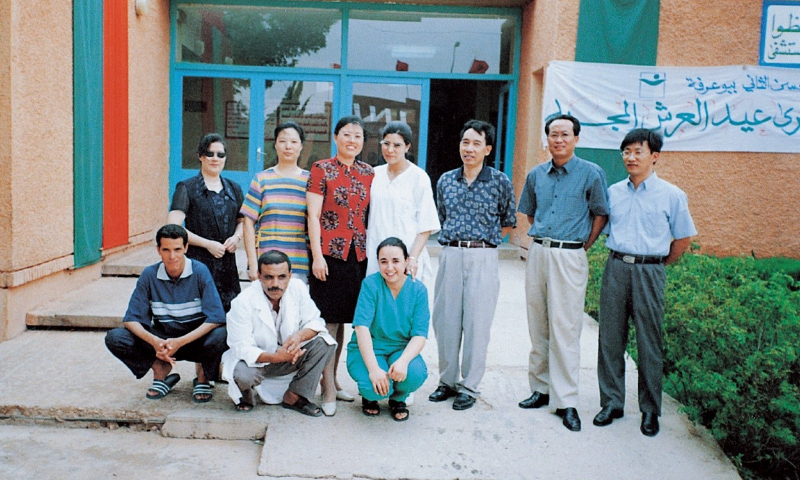
Sun Meifang (3rd from left, back row) and other Chinese medical staffers pose with their Moroccan peers. Photo: Courtesy of the Shanghai Eighth People’s Hospital
Professional spirits, caring hearts
Over the last 48 years, the Chinese medical team in Morocco has served 5.78 million patients and performed nearly 530,000 medical procedures, said Xinhua.
Through the decades, Chinese medical staffers in Morocco have impressed local patients and their medical peers not only with their exquisite skills, but also their professionalism and high standards of care.
During her work in Morocco, Sun placed the lives of her patients above her own. She once encountered a patient pregnant with twins who had suffered a possible uterine rupture, and the two fetuses were interlocked at the head. An urgent C-section became urgently necessary, but at that time Sun herself suddenly suffered atrial fibrillation.
To rescue the Moroccan woman and her two unborn babies, Sun performed the C-section after taking a large dose of cardiovascular drugs, risking her own life to save three. Throughout her two years in Morocco, Sun performed a total of 394 surgeries and rescued 1,149 patients. She was one of the 10 Chinese individuals and organizations to win the China-Africa Friendship Award in 2006.
The idea of trying their best to help patients is deeply rooted in the hearts of the Chinese medical team in Morocco.
In June, otolaryngologist Yu met a woman whose neck had developed a large pustule. The woman had received unsuccessful treatment for two months.
Yu smoothly excised the pustule, and helped change the patient's wound dressing each day after the surgery, a task that usually falls to the nurses.
The woman slowly recovered under Yu's great care. On the day of her discharge, she sent Yu a text message to express her gratitude.
"Allah sent you to [help] me," read one of the sentences in the message.
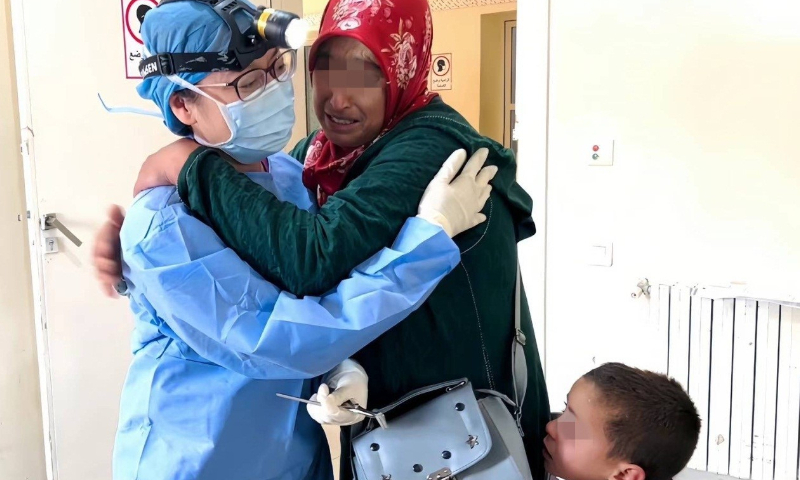
A Moroccan patient hugs Yu Yuejin and expresses her gratitude. Photo: Courtesy of Yu
A 'golden name card'
This year marks the 65th anniversary of the establishment of China-Morocco diplomatic relations. For decades, the Chinese medical team has been China's "golden name card" in Morocco, Yu told the Global Times.
She added that in Morocco, many Chinese medical staffers become friends with locals. They learn languages from each other, and share interesting things with each other.
In Taza, Yu, and her Chinese colleagues received a fresh gigot from Moroccan neighbors in this year's Eid al-Adha festival in June. The neighbors also shared figs with them during the ripening season.
There are few foreigners in Taza. Yu said that in the street, local people usually greet the Chinese people they encounter warmly, and call them "docteur (doctor)" no matter whether they are in white coats or not.
"And more often, they call us 'ami,'" Yu said with a smile. "This is the French word for 'friend.'"

